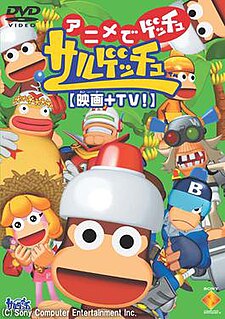
Yu-Gi-Oh! is a Japanese manga series about gaming written and illustrated by Kazuki Takahashi. It was serialized in Shueisha's Weekly Shōnen Jump magazine between September 30, 1996 and March 8, 2004. The plot follows the story of a boy named Yugi Mutou, who solves the ancient Millennium Puzzle. Yugi awakens a gambling alter-ego within his body that solves his conflicts using various games.
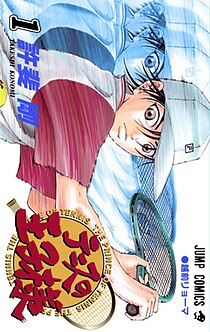
The Prince of Tennis is a Japanese manga series about a tennis prodigy written and illustrated by Takeshi Konomi. The title is often shortened to TeniPuri (テニプリ), a portmanteau of the words "Tennis Prince". The manga was first published in Japan in Shueisha's Weekly Shōnen Jump in July 1999, and ended publication in March 2008. A total of 379 chapters were serialized, spanning 42 volumes. As of volume 40, the manga has sold over 40 million copies in Japan. News that a sequel to the manga series was going to be developed was announced in the December issue of the Japanese manga magazine Jump Square. The new manga series, entitled New Prince of Tennis, began serialization in the Jump Square magazine in March 2009, with the story taking place several months after the end of the original manga. Viz Media acquired the license to distribute the series in English in North America.
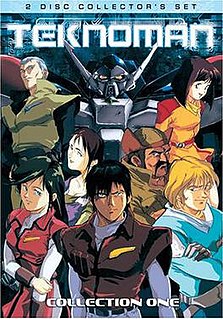
Tekkaman Blade is a 1992 Japanese anime television series produced by Tatsunoko Production and Sotsu Agency. The series was directed by Hiroshi Negishi and written by Mayori Sekijima and Satoru Akahori. The story follows an organization called the Space Knights and their war against aliens known as the Radam. The Space Knights are assisted by Takaya Aiba, who has the ability to transform into an armored warrior known as Tekkaman Blade.
Ape Escape -On Air- is a CGI anime television series produced by Xebec based on Sony's Ape Escape video game franchise. The series aired on TV Tokyo between April 8, 2006 and September 29, 2007 and loosely adapts storylines from Million Monkeys, Ape Escape 3 and SaruSaru Big Mission.

Ape Escape: Pumped and Primed, known in Japan as Gacha Mecha Stadium Saru Battle (ガチャメカスタジアム サルバト~レ), is a video game developed by SCE Japan Studio and published by Sony Computer Entertainment in Japan and that publisher and Ubisoft in North America exclusively for PlayStation 2. It is the fourth title in the Ape Escape franchise. It was never released in Europe, despite being advertised in the UK and Australia.
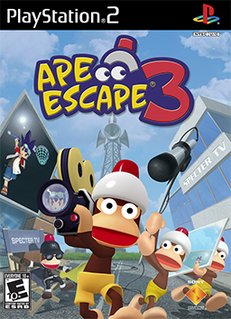
Ape Escape 3 is a platform video game published and developed by Sony Computer Entertainment for the PlayStation 2 video game console.
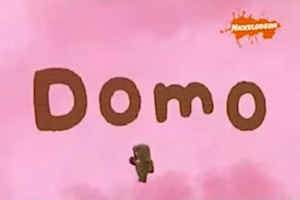
Domo TV is a stop-motion children's television series produced by Nickelodeon in collaboration with the animator Tsuneo Gōda and the NHK. The series consists of 26 two-minute episodes that were aired on Nicktoons in the United States and on Nickelodeon networks internationally. It was the Nickelodeon brand's first anime project and the second series after Kappa Mikey to be branded as a Nicktoons Network original program.
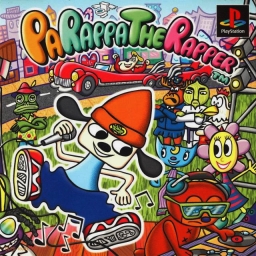
PaRappa the Rapper is a rhythm game developed by NanaOn-Sha. It was published by Sony Computer Entertainment for the PlayStation in 1996 in Japan and other countries in 1997. Created by music producer Masaya Matsuura in collaboration with artist Rodney Greenblat, the game features unique visual design and hip hop-based gameplay and is considered the first true rhythm game. It was ported to the PlayStation Portable in 2006. A remastered version of the original PlayStation game was released for PlayStation 4 in 2017 for the game's twentieth anniversary.

Black Rock Shooter is a Japanese media franchise based on characters created by illustrator Ryohei Fuke also known as Huke. It revolves around its eponymous character, a mysterious black haired girl with a blazing blue eye. The original illustration inspired a song of the same name by Supercell, which gained popularity on the Nico Nico Douga website. A 50-minute original video animation based on the franchise was produced by Yutaka Yamamoto's studio Ordet, written by Nagaru Tanigawa and Shinobu Yoshioka, and directed by Shinobu Yoshioka. A "Pilot Edition" was released on DVD and Blu-ray Disc in September 2009, before the full version was released on DVDs bundled with select magazines from July 24, 2010, subtitled in seven languages, followed by a retail release on December 17, 2010. An eight-episode anime television series, produced by Ordet and Sanzigen, aired on Fuji TV's Noitamina programming block between February 2 and March 22, 2012. The franchise has also spawned several manga series and a video game for the PlayStation Portable titled Black Rock Shooter: The Game, each set in their own universe.

Persona 4: The Animation is an anime television series based on Atlus' PlayStation 2 video game, Persona 4. The story revolves around Yu Narukami, a young teenager who moves to the town of Inaba, where a mysterious string of murders is taking place. Upon discovering a distorted TV World and acquiring a mysterious power known as "Persona", Yu and his friends decide to investigate the murders and save others from being killed.

Moero! Top Striker is a Japanese anime television series production based on soccer, set in the world of Italian youth football. Known in Italy as A tutto goal, despite the setting, it was not very successful in there, overshadowed by similar works such as Captain Tsubasa. It remains one of the most popular anime in France. In Japan it was aired on TV Tokyo from October 10, 1991 to September 24, 1992 and has a total of 49 episodes. In the Arab countries the anime is known as Captain Rabah, named after FC Porto striker Rabah Madjer and slightly adapted to his story as an Arab professional soccer player in Europe.
Ao Oni is a freeware role-playing horror video game. The game features puzzle and RPG elements, and revolves around a boy named Hiroshi, who is trapped with his friends in a haunted mansion, and is stalked by a monster.
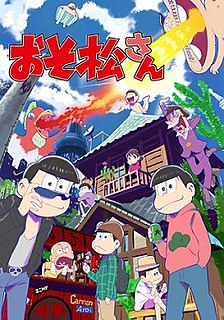
Mr. Osomatsu is a 2015 comedy anime television series by Pierrot, based on Fujio Akatsuka's 1962 manga series, Osomatsu-kun. Celebrating Akatsuka's eightieth birthday, the series follows the sextuplet Matsuno brothers from the original series as adults, and features more adult-oriented humor compared to the original series. The series aired in Japan between October 2015 and March 2016, with a special episode airing in December 2016. A second season aired between October 2017 and March 2018. Both seasons have been licensed in Americas by Viz Media. A manga adaptation by Masako Shitaro began serialization in Shueisha's You magazine from January 2016. A theatrical anime film premiered on March 15, 2019.

Persona 5: The Animation is an anime television series produced by CloverWorks based on the Persona 5 video game by Atlus. The anime series is directed by Masashi Ishihama and written by Shinichi Inotsume, with Tomomi Ishikawa adapting Shigenori Soejima's original character designs for the animation. Atlus employee Kazuma Kaneko created the original demon designs, while music composer Shoji Meguro reprised his role from the game.
This page is based on this
Wikipedia article Text is available under the
CC BY-SA 4.0 license; additional terms may apply.
Images, videos and audio are available under their respective licenses.



